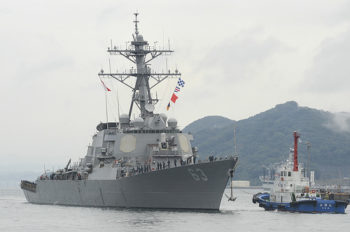
A U.S. Navy warship sailed near a disputed island in the South China Sea claimed by China, Taiwan and Vietnam on Sunday in an operation meant to challenge the competing claims of all three nations, a U.S. Defense Department official said.
The USS Stethem, a guided-missile destroyer, sailed within 12 nautical miles of Triton Island, part of the Paracel Islands in the South China Sea, the official said.
The operation was first reported by Fox News on Sunday.
It was the second “freedom-of-navigation operation,” or “fonop,” conducted during the presidency of Donald Trump, following a drill in late May in which a U.S. warship sailed within 12 nautical miles of an artificial island built up by China in the South China Sea.
China’s Ministry of Foreign Affairs said in a statement the U.S. ship had made an unauthorized entry into China’s territorial waters.
The operation was a “serious political and military provocation,” said the statement, issued late on Sunday, citing ministry spokesman Lu Kang. It said China had sent battle ships and fighter jets to warn off the Stethem.
“China strongly urges the U.S. side to immediately stop this kind of provocative action which seriously violates China’s sovereignty and puts at risk China’s security,” Lu said. China would take all necessary measures to defend itself, he said.
Chinese state-run tabloid the Global Times said in an editorial on Monday the United States was playing political games in the South China Sea and such patrols would not stop Chinese construction work there.
“U.S. provocations cannot change the present situation in the South China Sea,” it said.
Twelve nautical miles marks the territorial limits recognized internationally. Sailing within those 12 miles is meant to show that the United States does not recognize territorial claims there.
“Unlike in the Spratlys, where China has created new artificial territory in the last several years, it has effectively controlled the Paracels since 1974,” said Mira Rapp-Hooper, a South China Sea expert at the Center for a New American Security. “It claims illegal straight baselines around the Paracels, and the fonop may have been contesting these.”
The Paracels are also claimed by Taiwan and Vietnam. China fully occupied the Paracels in 1974 after forcing the navy of the-then South Vietnam off its holdings.
Trump has heaped praise on Chinese President Xi Jinping, but his administration has also stepped up pressure on Beijing as he has become frustrated that China has not done more to pressure North Korea over its nuclear and missile programs.
On Thursday, the administration imposed sanctions on two Chinese citizens and a shipping company for helping North Korea’s nuclear and missile programs, and accused a Chinese bank of laundering money for Pyongyang.
The Trump administration has also approved an arms package for Taiwan worth about $1.4 billion, the State Department said last week. China deems Taiwan its own and has never renounced the use of force to bring the self-ruled island under its control.
Trump is due to speak to Chinese President Xi Jinping and Japanese Prime Minister Shinzo Abe on Sunday, ahead of meetings he will hold with both leaders on the sidelines of the Group of 20 summit in Hamburg, Germany, next Friday and Saturday.
Copyright Ships & Ports Ltd. Permission to use quotations from this article is granted subject to appropriate credit given to www.shipsandports.com.ng as the source.
